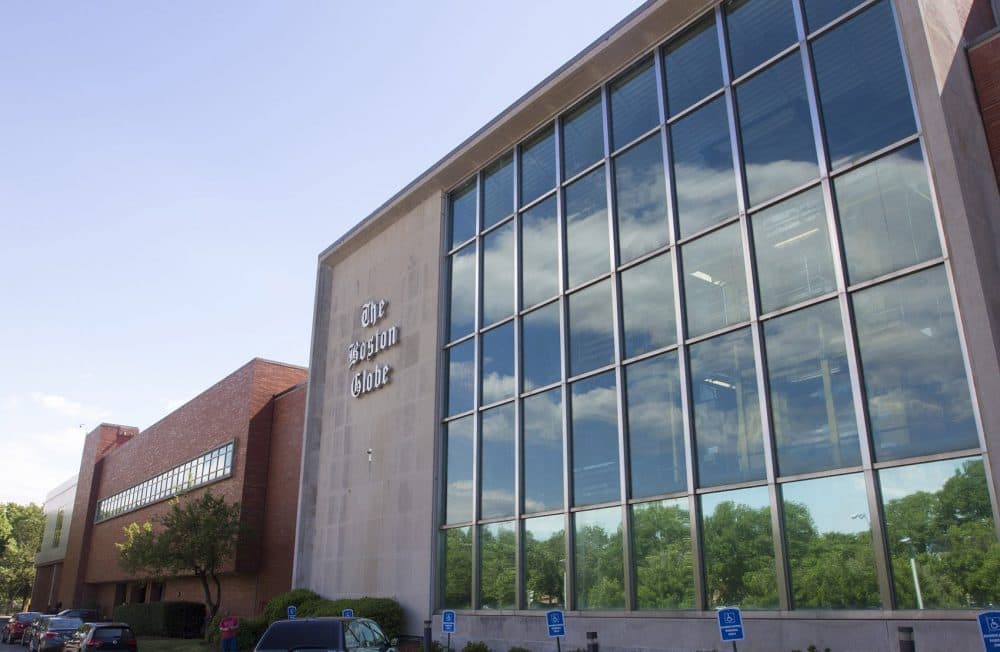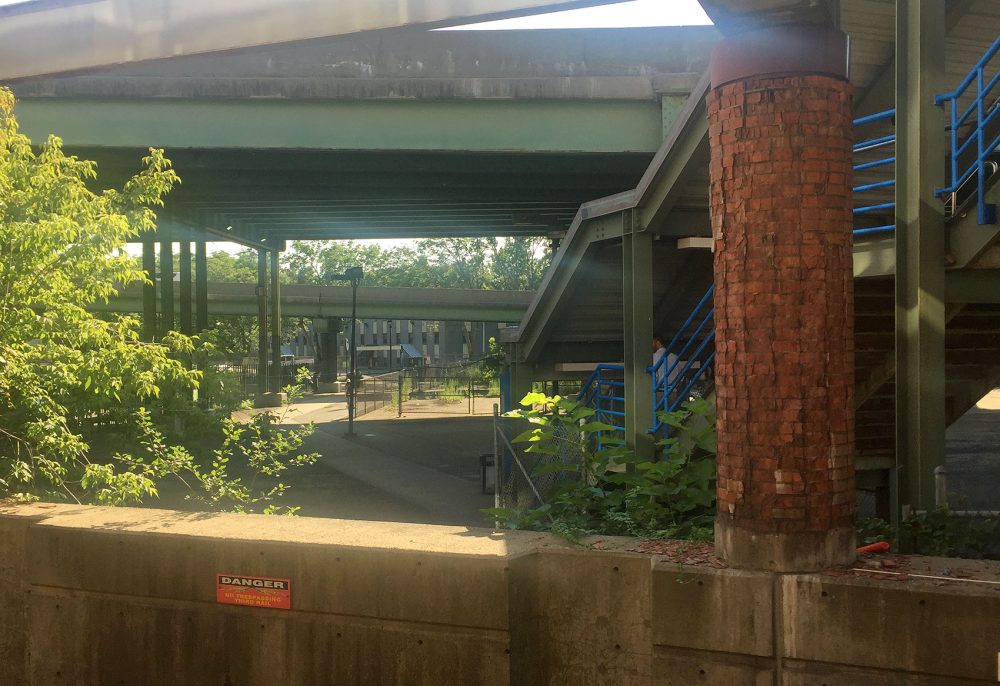Advertisement
Neighbors Watch To See What Will Be Developed At The Old Boston Globe Site
Resume
Now that the Boston Globe has moved its offices downtown and its printing presses to Taunton, its old 16-acre headquarters on Morrissey Boulevard sits nearly empty, though The New York Times is still being printed there and delivery trucks still park there.
The site is the largest commercial parcel on Morrissey Boulevard. The Globe says it's selling the property to Nordblom, a Burlington developer.
Some neighbors are watching anxiously as they await word from the buyers about what they want to do with the site.
Annissa Essaibi George is one of those neighbors. The city councilor meets me in front of the building where her mother worked a variety of jobs, including telephone operator, for 32 years.
"As did lots of neighborhood folks," Essaibi George says. "This was a local employer to our neighborhood."
Her mother lost her job when the Globe moved away earlier this summer.
A mile away at the Sugar Bowl, a coffee shop on Dorchester Avenue, another neighbor is watching anxiously.
Don Walsh, who's 70, has seen a lot of change in Savin Hill, where he grew up. The Irish Catholic neighborhood was centered around its parish. Then came busing, the exodus of many of Walsh's neighbors, and then, renaissance and surging home prices.
"Right around my house, I've got a Boston cop, a lineman for the phone company, a janitor in Boston public schools, a labor official, a guy who runs the New England Council, a doctor, a couple of lawyers," Walsh says.
Walsh, who was chairman of the citizen task force that developed the city's master plan for the area, sees the Globe's departure as an opportunity.
"We could really do something special, and it's right at the T, which is not only two branches of the Red Line, but also a commuter rail stop, and an on-and-off of 93, so it's probably one of the best planning and development opportunities in the city of Boston," Walsh says.
The master plan calls for mixed-use development, with buildings of increasing height as they get nearer to the JFK/UMass T stop.
The old Globe site is the key property in the plan to redevelop all of Morrissey Boulevard and Columbia Point, about as big a piece of Boston as the Back Bay or the Seaport District in South Boston. Next to the site is Savin Hill, with some of the most elegant Victorian homes in Boston.
Nordblom is the third buyer in two years for the site. Two previous buyers pulled out before closing.
City Councilor Frank Baker, who lives in Savin Hill, hopes the buyers will add the parks the master plan calls for.
"I'm not looking for just residential and restaurants or commercial. We need to make sure the green space is talked about," Baker says.

The development around Morrissey Boulevard is part of a wave of growth in Dorchester.
Today, Morrissey Boulevard acts as a barrier between Savin Hill and Dorchester Bay, but under a separate plan proposed by the state's Department of Conservation and Recreation, it will become much friendlier to pedestrians, as Morrissey will lose one car lane in each direction, to be replaced by bike paths. The idea is to turn Morrissey from the highway it is now to "a true urban boulevard" over the next 10 years.
This makes Eileen Boyle, of the Columbia-Savin Hill Civic Association, optimistic because the waterfront would become more accessible.
"We'll feel like they can go down there and walk and continue to walk all the way in town," Boyle says.
The city's master plan for the neighborhood calls for a grid of new streets that would go through the Globe property and others along Morrissey Boulevard to connect it to Savin Hill.
That's something Kenneth Osherow wants. The owner of McKenna's, a popular neighborhood coffee shop, also lives in Savin Hill. He says with all the one-way streets, the no-left-turns and the traffic, a trip to the beach in nearby South Boston can turn into an expedition.
Osherow calls the Globe site a fantastic property.
"We're talking on the coast at the connection between Dorchester, South Boston, downtown, three train stops away from South Station," Osherow says. "It is prime, prime, prime property. So it better be good."
McKenna's is as busy as ever. At the favorite stop for Mayor Marty Walsh, police officers, construction workers and local business owners, most people say they haven't given the Globe much thought.
Others, like flight crew members Kevin Noiles and Zachary Selzer, oppose any development that would bring more traffic.
"I live on Dorchester Ave.," Noiles says. "I'm actually going to get rid of my car because of the traffic. I'm going to start using the T because I just can't deal with it anymore."
"It's going to be like LA or New York City, in which it takes half an hour to even drive four or five blocks," Selzer interjects.
Mayor Walsh once lived in the neighborhood. His office released a statement saying he looks forward to the site being "utilized in a way that fits well with the surrounding neighborhood."
Back at the Sugar Bowl, Boyle and Don Walsh say they would like to see developers follow a comprehensive plan so that neighborhoods can feel connected to the harbor, unlike what happened in the Seaport District.
"That was done parcel by parcel," Boyle says. "There's no green space."
"That's not a neighborhood," Walsh says. "It's just a series of independent boxes stuck together."
Councilor Essaibi George, who grew up nearby, served on the task force that created the city's master plan for the area. She'd like to see housing for families as part of the mix of development.
"There is a lot of excitement about what the future holds for this area ... but there is also a lot of anxiety about what this change could mean," Essaibi George says.
This segment aired on August 7, 2017.
